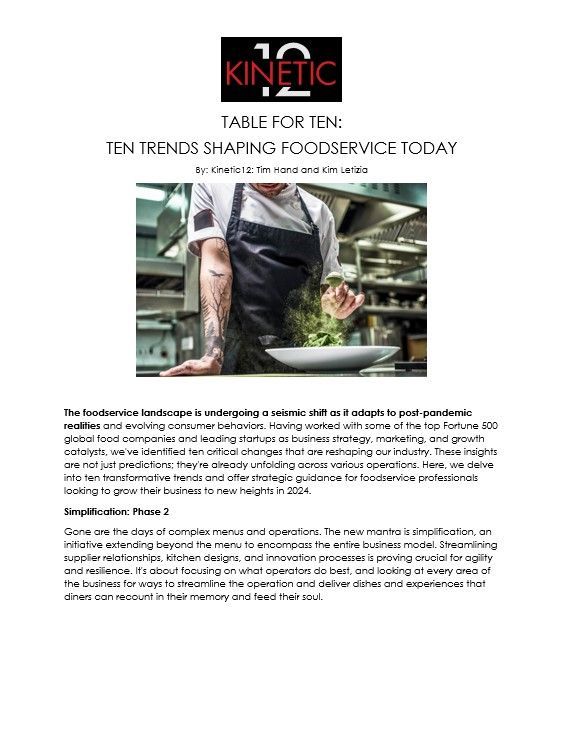Delivering Change: The New Dynamics of Foodservice Distribution
The foodservice industry is experiencing unprecedented change across the entire value chain. A challenging labor situation, evolving consumer preferences, changing menus, and rising costs are forcing all players to rethink their business strategies, management tools, and go-to-market approaches to adapt to the current environment.
As distributors are the key physical link in getting products to operators, it is essential for senior leaders to continually assess and adapt their distribution strategy.
In the time period since we partnered with the DMA to publish The
Distributor of the Future whitepaper, we've observed the following additional changes to distributor business models:
Accelerating E-Commerce Adoption
The adoption of e-commerce by the distribution community has been swift: while larger broadline distributors have been investing in e-commerce for years, many smaller distributors are now implementing e-commerce solutions. E-commerce has quickly become a key pillar of the foodservice distributor's commercial strategy. This is driven primarily by operators' increasing use of technology to learn about new menu trends, find product information, order supplies, and better communicate with trading partners.
Distributors are also recognizing the power of algorithm-driven suggestive selling and digital marketing capabilities inherent in e-commerce.
Growing Value-Added Services
As distributors seek to differentiate themselves from competitors, many have focused on creating value for the operator beyond the products they sell.
Today's chain operators are interested in more efficient service offerings, such as more frequent deliveries with smaller drops to facilitate their shrinking kitchen footprint and reduce potential waste, while street operators are looking for more support in creating business efficiencies, driving traffic, and managing resources. As a result, distributors are offering new operator support services such as website design, social media support, food cost control/item profitability analysis, menu planning tools and services, culinary support, POS systems/data analytics, and labor management tools.
Increasing Investment in Technology
As one senior foodservice leader asserted, "the ROI for investment in technology looks very different today when you factor in the (increased) cost of labor." It's true, the cost of labor has had a major impact on the profitability of distributors, causing them to look for efficiencies and solutions on how to do more with less.
While robotics in warehouses and autonomous trucks are still a few years away from becoming ubiquitous, distributors are leveraging closer-in technology to achieve operational efficiencies and drive down costs. Subscription-based SaaS programs like Customer Relationship Management (CRM) and next-generation inventory management tools are being implemented to automate repetitive tasks, streamline processes, and improve data accuracy. Ultimately, distributors recognize that additional investments in their technology foundation will better prepare them for the future and help them create a more sustainable business model.
Expanding into New Segments & Channels
With the learnings from the pandemic and its aftermath still fresh, foodservice distributors are increasingly looking to expand and diversify their businesses. For example, over the last several years, broadline distributors have acquired specialty distributors to make them more relevant within specific cuisine segments, acquired channel-specific distributors to expand their presence beyond traditional foodservice operators, and made additional investments in cash & carry stores.
Embracing Data as the Next Currency
Many distributors are investing in data analytics, dashboards, and reporting tools to make the data they collect more actionable within their own organization. They are also leveraging this data with the operators they service and selling data to supplier partners. As manufacturers and operators continue to develop tools to analyze and utilize data, the value of this distributor data will only continue to grow. Also, we expect the adoption of Artificial Intelligence (AI) in foodservice to further increase the value of data as a currency.
The foodservice value chain continues to evolve at a rapid pace. The recent announcement of the consolidation of two of the major sales brokers in the industry is the latest proof that the foodservice industry is at the tipping point of change. As a result, it’s more important than ever for manufacturers and operators to take a step back and evaluate their distribution strategy.
Some key questions to consider include:
- How am I currently partnering with my distributor partners?
- Are my current partnerships still aligned with my changing business needs?
- Am I getting the support I need from my distributor partners? If not, what does the right level of support look like?
- Am I utilizing technology in a way that complements my distribution approach?
- How can I better partner with my distributor and share data to create better outcomes (increased accuracy, better fill rates, optimized distribution, better LTO planning and execution)?
- Are there new partners I should consider as my business model evolves?

Once these questions have been answered, Kinetic12 recommends engaging with your current and potential distributor partners to plan your business collaboratively. Collaborative planning tools such as Joint Business Planning and the Operator Collaboration Model developed by Kinetic12 with IFMA can provide a starting point for developing a framework to adjust your business models and achieve better results both today and in the future.
To learn more about the changing foodservice environment and adapting your business strategies, please explore our website at
https://www.kinetic12.com/.
The year 2024 is set to be a landmark year in the foodservice industry, one that will set the tone for years to come. It's a year that challenges us to think beyond the conventional, to be bold in our aspirations, and visionary in our strategies. This is an invitation to embark on a journey that reimagines the very essence of dining, leveraging technology, embracing sustainability, and prioritizing human connections. Let's seize this opportunity to craft a future that's not just profitable but also enriching and inspiring.
The future is not just about adapting to change; it's about leading it. Together, let's challenge the status quo, adapt the business model to address the market's evolving needs, and be the architects of change that make 2024 a year to remember.
About Kinetic12: Art Bell and Jennifer Brizzolara are with Kinetic12 Consulting, a Chicago-based foodservice and general management consulting firm. The firm works with leading foodservice suppliers, operators, and organizations on customized strategic initiatives, as well as guiding multiple collaborative forums and best practice projects. They also engage as keynote speakers at operator franchise conferences and supplier sales meetings. Their previous leadership roles in restaurant chain operations and at foodservice manufacturers provide a holistic and well-rounded industry perspective.
Contact us to discuss or learn more about how we can help your organization understand the Restaurant of the Future and how Emerging & Growth Chains will define the future of foodservice.



